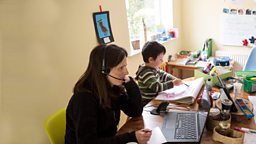Money tips for parents on lockdown
The coronavirus lockdown has caused financial difficulties for millions of people in the UK. Wages have been cut, pay rises cancelled, and work has dried up altogether for many. For lots of parents, school and nursery closures have added to their money worries.
At Radio 4’s Money Box, we’ve spoken to parents who are worrying about rising food bills, and feeling nervous about being called back in to work over summer while schools are closed, leaving them without childcare. So we’ve compiled some tips and advice for parents from experts to help you make the most of your money on lockdown.

-
![]()
Money Box Live: Single Parents
Louise Cooper and guests talk to single parents about the financial challenges brought about by coronavirus.
1. Check to see what support you’re entitled to
“If you’re struggling financially and finding it difficult to pay central costs, you can check to see if you’re entitled to support,” says Lee Healey of , a financial advice service. “The and , a charity that helps people access benefits, are two good places to start.”
If you are on universal credit, other benefits or a low income, you could also be eligible for a council tax reduction.Johanna Noble, Money Editor at MoneySavingExpert.com
“Many charities, like Turn2Us, offer non-repayable grants to help people on low incomes. You can check to see if you’re eligible on their website.”
Johanna Noble, Money Editor at , says it’s worth checking if you are eligible for using the government’s benefits calculator.
“If you are on universal credit, other benefits or a low income, you could also be eligible for a council tax reduction. This is a long-standing discount of up to 100%, and it doesn't matter if you own your own home or rent, or whether you're employed or not. Anyone can apply, but what you get depends on where you live, as each council runs its own scheme.”
And if you’re a parent whose income has dropped, you could be eligible for child benefit, worth £21.05 a week for one child under 16, £35 a week for two.

How has coronavirus impacted self-employed single parents?
A self-employed single mother describes coronavirus's impact on her finances.
2. Use the time wisely to take control of your money
Lee Healey of IncomeMax says it’s a good idea to use this time, particularly if you’re on furlough, to get on top of your finances and start budgeting.

“Use this time to take control - get on top of your household budget and write down exactly what income you have coming in, and what your outgoings are.
“When you’ve written it out, try and make some adjustments on your outgoings where you can so you feel more in control of your money.”
3. Take advantage of ‘free’ money
Johanna Noble of MoneySavingExpert.com says you can check to see if you’re eligible for the government’s tax-free childcare scheme.
Check to see if you’re eligible for the government’s tax-free childcare scheme.
“This scheme offers up to £2,000 a year per child towards childcare costs, but only a quarter of the 1.3 million families eligible for the help have signed up.
“While this is usually dependent on earning a minimum income of £140 a week, new rules introduced by the Government mean if you're temporarily earning less because of coronavirus, but would normally earn enough to qualify, you'll still be able to get free childcare and tax-free childcare as normal.”

How to make cash from your clutter
They're filling up our homes when they could be turned into cash instead.
4. What about if my kids got free school meals?
“If your child previously got free school meals then your school should make sure that something is put in place to provide this help in another way,” says Will Hadwen, legal advisor at .
“That could be via a voucher, and in some parts of the UK, a payment into your bank account. It's different in different areas so you'll need to talk to your local council if you're not getting this help or it's provided in a way that doesn't work for you.”
Johanna Noble of MoneySavingExpert.com says it’s important to remember that the government has confirmed vouchers will not be available during the school summer holidays.
-
![]()
The food that's bringing people hope during lockdown
The ingenious solutions volunteers are finding to help others.
5. I’m struggling to pay my bills - what should I do?
With more families staying at home, plenty of parents could be in for a nasty surprise in the form of a higher electricity and gas bill. If you’re worried about falling into debt, early intervention is important, says Lee Healey.
If you’re worried about falling into debt, early intervention is important.Lee Healey of IncomeMax
“It’s better to get debt advice as soon as possible if you’re falling behind on payments, don’t wait until things start to get out of control.”
“Get in touch with a specialist debt advisor - organisations like can offer support and advice if you’re concerned about falling into debt.”
Johanna Noble says gas and electricity suppliers might be able to help if you’re falling behind on your payments.
“Some companies can offer payment breaks, reduced repayments, and time to pay. Suppliers should not disconnect credit meters during the pandemic.”

Taking unpaid leave to cover childcare?
Charlee may have to consider unpaid leave in order to cover childcare for her son Ted.
6. Shop savvy
The weekly supermarket shop can add another strain on the family budget, especially with lots of mouths to feed.
Buy supermarket own to see if you can tell the difference. If you can't, then stick with the cheaper product.Johanna Noble of MoneySavingExpert.com
“The main way to save on your supermarket shop is by 'downshifting',” says Johanna Noble of MoneySavingExpert.com
“This means dropping a brand level lower than you're used to - for example, buying supermarket own – to see if you can tell the difference. If you can't, then stick with the cheaper product. It's another pain-free saving, as you don't notice the difference, except in your wallet.”
7. Keep communicating
The says it’s important for couples to talk frankly with each other about money and budgeting - especially parents, as couples with kids spend over £100 a week more than couples without.
They recommend setting up a family budget that you can both work to.
“If your partner feels budgeting is too much work or is worried about sticking to, come up with a basic budget that covers the main things like mortgage and bills, food, etc,” they say.
“Avoid blaming your partner - tell them the conversation isn’t about who’s good and bad with money, but how you can achieve your goals together.”
Listen to more on Money Box Live

Hidden debt: what you can do to help yourself
Would you be completely honest with your partner about how much debt you’re in?
More from Radio 4
-
![]()
Money Box Live: Single Parents
Louise Cooper and guests talk to single parents about the financial challenges brought about by coronavirus.
-
![]()
How to avoid getting into debt
Tips from the 91�ȱ�'s Smart Consumer podcast and debt charity StepChange on avoiding debt.
-
![]()
Seven things you may not know about debt
A look at the impact of borrowing on people's lives, bank balances and mental health.
-
![]()
How to make the most out of your money
Top tips about how to avoid being duped in stores and how to save more successfully.





